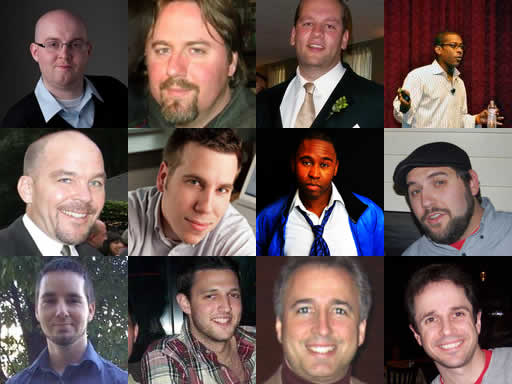In the past 8 months I have been faced with some hard questions.
I have interviewed at least 100 people, 30 or so of which were for SEO positions – if not more, and this was only after completing hundreds of screening calls. I think I was alright at answering most questions, certainly not all, but there were a few that I was never quite sure of.
The types of questions that catch you off guard, or leave you wondering “Was that a good answer?” So I kept a list of these questions to build off of and for future reference during my interviewing and on-boarding. I was never really sure what to do with them, until I saw this tweet:
[blackbirdpie url=”https://twitter.com/#!/011100110110010/status/163706077383368704″]
and after reading the article I figured since I know some smart SEO’s right here in Philly, I would just ask them.
Below is a short summary of each of the people who were so kind to contribute their thoughts on my questions, and help me gain some insight into what I consider ‘not your average SEO questions.’ Enjoy.
Table of Contents
- 1 Ian Howells
- 2 Justin Freid
- 3 Bill Sebald
- 4 Wil Reynolds
- 5 Bill Rowland
- 6 Eppie Vojt
- 7 Mike King
- 8 Anthony Moore
- 9 Chris Countey
- 10 Jed Singer
- 11 Martin Weinberg
- 12 Mark Kennedy
- 13 Questions
- 14 1. What is the hardest thing to teach in SEO?
- 15 2. In the SEO industry, what frustrates you more than anything else?
- 16 Ian Howells
- 17 3. If you could give one piece of advice to someone considering getting into SEO, what would it be?
- 18 Conclusion
- 19 Colophon
 Ian Howells
Ian Howells
Director of SEO, TrueAction
Ian is probably best known for his candid, no bullshit approach to SEO. He understands what works and what doesn’t because he’s tried it, not just read about it. With a keen grasp on what really matters to search engines, and loads of hands on experience, Ian is a wealth of knowledge when it comes to search. If you haven’t already, make sure you check out his personal SEO journal at Halo18.com. One of my favorite recent tweets from Ian is:
[blackbirdpie url=”https://twitter.com/#!/ianhowells/status/152100702028701696″]
 Justin Freid
Justin Freid
Media Supervisor, TPG
Justin manages digital media for some of the largest brands on the internet and has a strong reputation for understanding enterprise-level PPC. A frequent contributor to Search Engine Journal on the topic of paid search, Justin has developed a reputation for squeezing value out of PPC campaigns. One of my favorite recent tweets from Justin is:
[blackbirdpie url=”https://twitter.com/#!/Justin_Freid/status/110864216927383553″]
 Bill Sebald
Bill Sebald
Digital Marketing Manager, Quench U.S.A, Inc.
Bill is probably best known for his blog Green Lane SEO. Bill is an all around tech junkie and has been involved in digital media since the 90’s. I first stumbled across Bill’s site while poking around Google for SEO’s in my hometown (Bill and I are both from Berks County, just like Taylor Swift). I was not expecting to find much, so it was very surprising when I came across Green Lane SEO, and after hanging out with Bill at a few Grail’s, I started following his work. One of my favorite recent tweets from Bill is:
[blackbirdpie url=”https://twitter.com/#!/billsebald/status/137270804026114048″]
 Wil Reynolds
Wil Reynolds
CEO, Seer Interactive
In Philadelphia, and throughout most of the search industry at this point, Wil needs no introduction. After gracing the cover of the Philly Business Journal to start the year, and with frequent appearances on SEOmoz, Wil is well known for continuing to find new ways to innovate link building. What many SEO folks don’t know is Wil’s deep commitment to the Philadelphia community, as shown in one of his recent tweets:
[blackbirdpie url=”https://twitter.com/#!/wilreynolds/status/143780600497704961″]
 Bill Rowland
Bill Rowland
Sr. SEO Manager, TrueAction
Perhaps best known for organizing SEO Grail Philadelphia, Philly’s most popular SEO Meetup, Bill has been heavily involved in internet marketing since first getting into eCommerce for a large Philly-based retailer back in 2000. Bill’s fun outlook on SEO and ever-present sense of humor have made him a crowd favorite for chatting SEO over a few beers, and here is an example from one of my favorite recent tweets:
[blackbirdpie url=”https://twitter.com/#!/billrowland/status/94042773514240000″]
 Eppie Vojt
Eppie Vojt
Digital Marketing Consultant, JPL Creative
Eppie is best known for his development of the CTR Theme, and in many small SEO circles for his uncanny knack for discovering major opportunities that he has become famous for successfully exploiting. When he’s not busy building or flipping websites, you can… actually nevermind, that seems to be all he does all the time. Eppie will occasionally tweet, and when he does you can look our for gems like this:
[blackbirdpie url=”https://twitter.com/#!/eppievojt/status/164755218549063680″]
 Mike King
Mike King
SEO Manager, Publicis Modem
Mike is a Philly transplant now gracing Brooklyn with his keyword genius and charm. He is probably best known for his development of keyword level demographics and has recently been speaking all over the world at various search and link-building conferences. Mike’s unique mix of talents, including blind rapping and partnering with Dr. Seuss to teach SEO, come mostly from his previous life as a software and web developer turned SEO Engineer. Mike’s candid approach to all things search make him truly entertaining to follow, as can be seen in one of my favorite recent tweets:
[blackbirdpie url=”https://twitter.com/#!/iPullRank/status/164377637442158592″]
 Anthony Moore
Anthony Moore
SEO Manager, TrueAction
I first met Anthony, like many of the people on this list, at SEO Grail. What I like best about Anthony is that he is very down to earth and doesnt seem to take much for granted. This could be due to the fact that he works alongside some SEO powerhouses in his current role, but I like to believe it’s just cause he has his head on straight. Keep your eye out for this guy, I promise you will only be hearing more about him. In the meantime, here is the kind of personal insight you can look forward to on twitter:
[blackbirdpie url=”https://twitter.com/#!/amoore138/status/143340727068409856″]
 Chris Countey
Chris Countey
Director of SEO Strategy, WebiMax
Chris and I first met during October’s SEO Grail Meetup and I very clearly remember being impressed by both the questions he asked and insights he offered regarding his personal experiences with paid search. Chris is relatively new to the SEO space in comparison to some of the veterans in this post, but he’s hungry. Chris’s ambition to learn and close monitoring of social marketing almost guarantee you will you continue to hear about him in the months to come. Here is one of my favorite tweets from Chris:
[blackbirdpie url=”https://twitter.com/#!/chriscountey/status/157168283605417984″]
 Jed Singer
Jed Singer
Engagement Manager, Stuzo | Dachis Group
Truth be told, I haven’t met Jed in person yet, but I have been following him since the first time I overheard someone mention his name @IndyHall. I believe the context went something like this “Yeah Singer tweeted about it, I didn’t realize either,” referring to data regarding Facebook overtaking Twitter as a mainstream news source; which was more than enough to arouse my curiosity. Ever since I have been enjoying his near real-time updates about all of the different ways to leverage social media and crowd-sourced feedback. Here is a preview of what you can look forward to as a Jed Singer follower:
[blackbirdpie url=”https://twitter.com/#!/jedsinger/status/136209244897808384″]
 Martin Weinberg
Martin Weinberg
VP of Digital Strategy, eCity Interactive
I have only had the very brief pleasure of sharing a handful of SEO Grail’s with Martin. He always shows up ready to learn, offer his personal experiences, and ask solid questions. For one of the more executive types at our casual Meet-ups, Martin’s presence is missed when he is not in attendance. Follow Martin on twitter for more tweets like this one:
[blackbirdpie url=”https://twitter.com/#!/MartinWeinberg/status/137180380867477505″]
 Mark Kennedy
Mark Kennedy
Founder, ROI Maximizer, SEOM Interactive
Mark may be one of the best kept secrets for local SEO in Philadelphia. I first encountered Mark not as a friend, but as a competitor, while managing an SEO services firm in my past life. I have clear memories of finding out that prospects were working with his firm, SEOM Interactive, and decided not to waste my time trying to outsell the value he provides. Mark is a committed CEO and very talented SEO. On top of it all, Mark is one of the most humble and down to earth guys I have met within Philly’s SEO circles. Follow him on twitter for more awesome tweets like this one:
[blackbirdpie url=”https://twitter.com/#!/markkennedysem/status/143311865269854208″]
Questions
1. What is the hardest thing to teach in SEO?
Ian Howells
The necessary mindset.
That almost feels like I’m cheating because it’s an umbrella for a lot of things.
You need someone to be prepared and aware that this isn’t an assembly line. You can’t just hit a few buttons and call it a day. (Well. You could – when you get really advanced. But, that’s not the point.) You need someone to understand what Google is trying to do. You need them to get their head around how they would organize all the pages on the web for any given topic. To think through what a “good” web page looks like vs. what a “great” page looks like. Then they also need to be completely willing to roll up their sleeves and do the work. And then maybe completely tank the next time Google rolls out something like Panda, only to dust off and get back at it.
This stuff is a long haul business. Chess – not checkers. You need to plan ahead and execute. Frankly – some people are much more fit to just moving in one direction, trying to get kinged. And that’s fine, but this probably isn’t the game for them.
Justin Freid
So much goes into SEO – link building, sitemaps, overall strategy, content, keyword research, keyword mapping, HTML code, javascript and now social. SEO is so much more now then just search engine optimization. Taking an intern or entry level employee and teaching them everything about SEO is a huge task. All of the tactics/strategy can not be taught right away. You have to introduce an employee to them in stages, which can lengthen the process.
Bill Sebald
I find that the hardest thing to teach is the true concept of SEO ROI. A lot of my past clients didn’t listen to my explanation of the channel, and how I approach it. They came back after a long, tedious pitch process asking me “how many dollars will you make me for one dollar?” I’ve had relationships end because I couldn’t get them out of that mindset, no matter how hard – and honest – I’d been. It’s a shame, because they’re narrow focus caused them to miss out on all the other marketing values that would have helped them in their long run. SEO is a really unique, powerful channel.
Wil Reynolds
The hunger, the competitiveness, you can’t teach someone that, once they have that everything else will just happen.
Bill Rowland
Search Engine Optimization continually challenges both practicing and aspiring SEOs. Changes in technology, client needs and misinformation can test the most experienced practicioners. Most SEO functions can be learned by applying some determination and patience however there is one area that is very difficult to teach. Curiosity is one personality characteristic that should be considered an essential skill in an SEO’s toolset. Generally, I think that most people would agree that curiosity is the one trait that many successful SEOs from a diversity of backgrounds share. Therefore curiosity is the hardest thing to teach in SEO.
Eppie Vojt
Tactics aren’t hard to teach. Strategic thinking is. For the most part, it’s one of those things that you either have or you don’t. Anyone can learn how to add directory links or use a private blog network. Not everyone can see creative ways to build links or spot opportunities to automate mundane tasks.
By going beyond basic tactical implementation you can create solutions that scale better or deliver more authority. That’s where you start adding real value for clients and start to become a trusted partner, not just search muscle.
Mike King
The hardest thing to teach in SEO is the spirit of continued learning. Typically in other industries people tend to quickly plateau and get comfortable with their level of understanding and in SEO that just doesn’t cut it as it is a forever protean art and science. Also it’s impossible to teach imagination. I would very much prefer to work with imaginative people with far less experience than senior people that are stuck in their ways.
Anthony Moore
I’ll say that strategy (recommendations, analytics, etc) is the hardest thing, in my experience, to teach in SEO. Learning how to measure the success of your recommendations and using that data to improve performance is one of the most difficult things to impart on someone who is just getting into the industry.
The amount of data that an SEO sees on a daily basis alone should not be recommended for the faint of heart. Then taking that data, distilling it down and presenting to a client (that probably doesn’t fully understand what it is you do) is a pretty scary undertaking. While this comes with experience, when you’re first starting out, it’s not easy.
Chris Countey
Expectations. There is no magic bullet that will help a client achieve results. Assigning weight to any part of an SEO campaign can make an SEO and their clients lose site of the overall goal: conversions.
Jed Singer
Optimization can be achieved through a scientific process, but there is also an artistic element to it. You have to be in tune with algorithms across the search platforms, and be able to apply knowledge of your space and your consumers to your presence in the appropriate ways in order to affect those algorithms. The hardest thing to teach is the artistic side of the application; staying abreast of the algorithms, understanding the channels, and each channels’ nuances based on both the consumer and the brand presence being optimized.
Martin Weinburg
The hardest thing to teach is for someone to focus attention on those aspects that have meaningful results to the business. In other words, activity versus accomplishment.
Mark Kennedy
Desire. I know that sounds weird, but it’s the truth. Unless someone has the desire to do this, they won’t like it. Most (if not all of us) are self-taught. They are just touching on SEO in schools, but not heavily and most people who are already in the industry had to learn by doing, experimenting, discussing with colleagues, etc. So if you don’t have the drive to learn and achieve, then you won’t like this world.
You have to “geek-out” a bit when you see a keyword convert into a sale, when you see a keyword jump in the ranks, when you get a sweet link or find a piece of gold in a competition analysis. And that’s something that is hard to teach, you just have to “have” it.
Don’t get me wrong, having different backgrounds and experience will help. Marketing, programming, design, PR, writing, finance, math, etc. But truthfully this industry changes fast and furious, so you have to be willing to learn, test and adapt. If you don’t have the desire to do that, you’ll get left behind.
So typically the person with that desire can learn a lot and are better students of the game. So when we look for people, we tend to focus on two things. The ability to learn (of course) and the desire to learn. If you have that, you can learn anything and be successful.
2. In the SEO industry, what frustrates you more than anything else?
Ian Howells
The cult of the rock star. Currently, you can be viewed as an awesome SEO if you talk a good game and self promote 24/7. No need to have a good spot at a sizable agency. No need to have your own affiliate sites to hold up publicly. No need to have a list of clients that vouch for you. Just guest post enough at the right places and know what you’re talking about and you’re a stud.
Take PointBlankSEO. Kid seems super sharp. Truly. I mean that without a single ounce of sarcasm. And he’s everywhere. To the point where I thought for *sure* that he was either having someone ghost write his blog posts, or he was middle-manning all his work. (Which, should be a testament to how prolific he is, and how I think there’s clearly time put into what he’s publishing.)
Then I found out he’s 18. Kid’s not even in college yet. That’s why he’s got the time to blog all day. He doesn’t have a wife or kid to provide for. He doesn’t have a mortgage. He can just blog. He mentions having clients – but that could be a 10 page site for a local dentist for $200 a month for all I know. Maybe not – maybe he’s ranking 12 different businesses all at once… but based on the time he seems to have to put towards blogging, I doubt it. Though – if I’m wrong, and he’s spending more time doing SEO than blogging about it, my hat is freaking off to him.
But, despite all that. Even if he had *no* clients and we didn’t know it – he’d be a stud in the industry because he can blog.
I’m not trying to pick on him, but I think he’s the perfect example of the dangerous place we’re getting to. Where being able to blog well and self promote and grind out post after post is more praised than actually getting stuff ranked and banking. The big SEO affiliates making ridiculous money aren’t the SEO industry rock stars, even though they’re the most qualified to be. You ask a random group of Search Engine Watch or Sphinn or SEOMoz readers who Eli Aloisi is, and most would have no idea who you were talking about. Part of it is because we’re all largely so hush-hush about where we’re ranking (which I’m completely guilty of), but the other is the rock-star mentality. Where knowing and telling all is more rewarded than doing. That worries me.
It worries me because it seems to push this idea that just knowing theory is enough. That firsthand experience and time spent are secondary to knowing the theoretical best practices and being able to turn them into an infographic or Top Something List.
It worries me when networking with SEOs seems to be the most important part of being a well known SEO – not actually ranking for high competition terms.
Justin Freid
Having worked across many competitive (sometimes sketchy) industries, Finance, Education, Insurance and Health, seeing a site rank ahead of me with blatantly purchased links or low quality content is quite frustrating. It seems that if 85% of the top companies in the space are utilizing grey hat tactics, Google turns the other way and it is accepted.
Bill Sebald
There’s two things that bother me equally. First, the fact that we teach “content is king” while continually pumping out fluffy, non-specific, non-targeted articles. Content that has no real value is a waste of time. It’s noise in the signal. I see it in the SEO industry too often, when I read a full page article and walk away with nothing I can actually act on.
It’s OK to have op ed pieces from time to time, but I don’t think it’s appropriate to grab an audience with an “I will teach you something awesome” headline, only to not deliver on any of it. Many of the big guys do it. They give some light tip, with no details, that leaves you more confused than before you started, while the commenters all praise the tip. I feel like I’m taking crazy pills when I read this. I’ve been in this game for over 10 years, and I still walk away scratching my head from a lot of SEO posts that get mad praise. Come to think of it, sometimes SES and SMX aren’t much better. I believe SEO is writing for the audience first and search engines second, and you should have the courtesy to make sure you properly teach what you say you’re going to teach.
The second frustration is how certain parts of the SEO industry has become like the entertainment business. From Sphinn to Twitter, great information lies all over, not just with the celebrities. I tend to follow people who curate good information over people that have good PR. I think most of the SEO industry is pretty silly, and I have no idea how someone who blogs and tweets all day can be an authority.
Wil Reynolds
How spam works, google talks poorly about spam, but then when you see how well it works, relative to what they tell you to do its frustrating.
Bill Rowland
Our industry possesses many frustrating aspects. From unethical salespeople to bandwagon jumpers trying to benefit from the “newest” trend, our industry is rich with potential aggravation. My primary frustration is the SEO community’s apparent shift from recognizing members for the substance of their work to their personalities. Propagated by social media services like Twitter and legitimized by a presence at seemingly curated industry conferences, SEO has almost become more about who you know versus what you know. And that’s frustrating.
Eppie Vojt
Within the industry, the thing that frustrates me the most are SEOs who don’t test things themselves. There are a ton of people who are just part of the echo chamber, voicing back what they’ve heard from their favorite SEO celebrity (whether it has merit or not). This slows the learning curve for a lot of beginner SEOs and stunts their development.
The most frustrating thing about doing SEO consulting for clients is making great recommendations that don’t get implemented. There’s a host of reasons why this happens — whether the client’s short on budget, doesn’t have the technological skill necessary to act on your findings, or something else.
That’s why it’s important to know how to sell as an SEO. You need to be able to present your ideas in a convincing fashion and anticipate potential barriers to implementation.
Mike King
I work with a lot of Fortune 500 and enterprise brands and it’s very frustrating that they don’t allow us to get things done and there’s so many capabilities that you have to keep happy in order to get the slightest changes pushed through. The general lack of respect for SEO as a marketing channel is incredibly frustrating but I’m happy to be in a position to speak to big brands and help change the perception..
Anthony Moore
So there are a few things that I get frustrated with. There seems to be a lot of “who knows who” that goes on in the industry. While it’s not necessarily a bad thing, I’d rather read or hear about your thoughts and ideas, than who you had dinner with last night.
Another part of the industry that frustrates me is the re-purposing of the same presentations over and over. We talk about keeping things fresh, it would be nice if we could see some fresh topics on the speaking circuit. Those conferences aren’t cheap!
Chris Countey
SEO rockstars who forget where they came from. The best thing about this industry is that it is constantly changing and there is no one source that has all the answers. Each new piece of content that enters the SEO space should be evaluated and tested individually, regardless of who the author is. Clearly there are some very knowledgeable people in the industry, but they too are susceptible to algorithm changes and advances in computer learning. Test everything you read and write about everything you test.
Jed Singer
One of the frustrating parts of the SEO industry is a marriage to the way things have been done in the past, despite platforms and users changing rapidly. As the space changes, methodologies and best practices also need to change.
Martin Weinburg
With regards to the SEO industry, I see many companies that provide clients reports that are pure data, without analysis or perspective. Without meaning and context, the statistics alone aren’t delivering real value.
Mark Kennedy
Failure. Yes, it makes you better, but it still sucks. Mainly because failure can be the end result of a lot of time, thought and effort. You come up with this master strategy. You put hours/days/weeks into fine tuning it. You execute it and…it fails. The most frustrating thing.
Sure you will learn from it. And most likely it will lead to something else or a different path. But when I get really excited about a strategy and it falls flat, it frustrates the hell out of me. It just happened to me recently with a project. Sure, we’ll fine make adjustments or take it another direction, but I really thought it was awesome. Turns out it wasn’t.
One other thing is frustrating – Time. Or lack there of. There’s no doubt this is a growing industry and it moves at a furious pace. Unfortunately, we can’t hit the “pause” button on time. I would pay a LOT of money for that. How many times do you find yourself in a zone and then look up at the clock and see it’s 2am or you’re supposed to be somewhere an hour ago?
Yes, there are a lot of tools to help make you more time-efficient and things that are scalable. But you know there are some things you just have to spend a lot of time doing, research being a big one. I find it hard to believe that there is currently any SEO who is not working during “off” hours. Or even when they are out and about, still not have SEO cross their mind. It’s just the way SEOs are wired.
So for me (and I’m sure others), it can be frustrating when there is just not enough time in the day/week/month/year.
3. If you could give one piece of advice to someone considering getting into SEO, what would it be?
Ian Howells
Start a site – today. Run it for three months. If you still have the drive to do this, then get reading at SEOMoz until you’ve got the ins and outs of on page SEO and keyword research handled
After publishing good, targeted content for a few more months, learn up on link building.
Keep learning.
Justin Freid
If you are not looking for a challenge or an industry where you need to constantly learn, pick something else. SEO/PPC is a very competitive industry where new strategies and tools are coming out every day. It is an extremely exciting and rewarding industry. So if you are just getting your feet wet, start reading as many top blogs as you can, buy yourself a domain and start messing around to see what works.
Bill Sebald
Read everything judiciously, and use it to define what part of SEO you want to excel in. What part do you believe in? What part interests you the most? Focus on that area, turn it into your strength, and branch out from there. Don’t try to mow the entire lawn with scissors at once – just focus on one area at a time so you’ll get firmer results. This is like learning an instrument – be prepared to be learning for the rest of your career.
Wil Reynolds
Read everything, help a LOT of people out – just help out SEOs left and right, you’ll network your way right into their inner circle.
Bill Rowland
In short, the one piece of advice to a prospective SEO that I would offer is that to be successful they must be curious, persistent and data driven, not to mention creative. The nature of search engine optimization is one of grey versus black and white, so people with these qualities should find that they should perform well and find the field rewarding.
Eppie Vojt
Build your own sites on the side and experiment with them to rank for competitive terms. Having complete control over the decision making process (including risk assessment of various approaches) means you can try all sorts of tactics, push hard, and move quickly.
You’ll get to discover exactly what works and what doesn’t and be able to make better decisions about what to recommend for your clients. You’ll also be much more comfortable discussing tactics with them, highlighting the potential risk vs. reward, and drawing on historical successes when needed.
Running your own sites can also give you insight into a lot of the digital marketing considerations that extend beyond picking up rankings. You’ll develop a deeper appreciation for the need to assess the conversion potential of keywords, identify additional revenue opportunities, and implement a good user experience.
Having my own side projects has taught me much more than I would have learned from doing client work alone.
Mike King
Test everything you read and never stop learning.
Anthony Moore
Build your network. Get to know your local community. Hit the meet-ups (even “off topic” ones). Surround yourself with smart people who are passionate about they do. I would, however, practice some restraint when building this network. There is a pretty healthy stream of info coming in at a rapid pace and it’s easy to get overwhelmed. It’s important to be able to separate the wheat from the chaff and keep those you trust at the top of your list. All killer, some filler.
I have to say, it was fun to put some of these thoughts down on paper. The “hardest thing” question, was real thought provoking and I may have uncovered some other opinions on it…maybe it’ll be a blog post in the future!
Chris Countey
Start with the basics of web design. In my opinion, it’s more important to know what a website can do. Anyone with knowledge of web programming can make those changes, but it’s those who decide what needs to be changed who make the difference.
Jed Singer
Understand where the SEO practices has been in the past, and understand the infrastructure of the search platforms that your consumers use. Social channels, like Facebook, Twitter, and others, are a huge part of search, and big wins – both quick and more drawn out – can be achieved when leveraging both mainstays, like Google, and new channels.
Martin Weinburg
The advice I’d give someone getting into SEO is to realize you are not working in a silo, and this is not a number-cruncher job. You’ll need to coordinate, negotiate and evangelize your recommendations among managers, designers, programmers and copywriters.
Mark Kennedy
Do it. I love it and I’ve never looked back. It’s awesome. But the advice I would give is that you have to want to get into it. It goes back to my first answer. Desire. If you are not sure it’s for you, it’s probably not. You have to have a bit of the geek-gene.
But as for specific advice – test some things. Basic things to start, but those things will take you deeper. Create a blog, try creating a word press site, put Google analytics on a current site and watch the metrics, etc. You’ll learn a lot that way and once you have a little taste of SEO, you’ll have more specific and better questions to ask. And just that much more experience.
Conclusion
First and foremost, a huge thank you to everyone who contributed; it is because of you that this post came together. I love seeing patterns emerge between great minds; with lifelong learning, exhaustive testing, and constant creativity standing out as the real nuts and bolts of the insights provided in this post.
This comes as a sequel to SEO talks, the first interview was with Todd Malicoat about linkbuilding strategies and going beyond that, exploring negative SEO and how to deal with it.
I hope you have found these insights helpful and thought-provoking. If so follow me @seonick to stay abreast of the latest insights on the SEO industry, Start-up companies, and content strategy. Also if you aren’t already following each of the brilliant minds featured above, make sure you do immediately, you won’t regret it.
Colophon
Inspiration to write this post came to me while reading the best SEO interviews you will read in 2012. Sean Revel, better known as @011100110110010, uses this post to ask some awesome people some great questions, and if you have not read it yet, go do that now.







